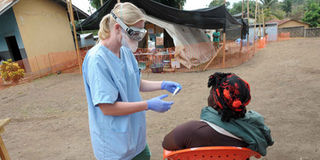Breaking News: At least 10 feared to have drowned in Makueni river
Prevent Ebola from entering Kenya

A nurse from Doctors Without Borders (Medecins Sans Frontieres) examines a patient in the intake area at a centre for victims of the Ebola virus in Guekedou, Guinea, on April 1, 2014.
With the recent outbreak of Ebola in Uganda, Kenya is among the nations that are at risk and needs to take urgent preventive measures.
Ebola is a rare, deadly viral disease in people and non-human primates, according to the World Health Organization (WHO). This virus was first discovered in 1976 near the Ebola river in what is now the DRC, and since then the virus has emerged periodically and infected people in several African countries.
Uganda and the Democratic Republic of Congo are prominent countries with a history of Ebola outbreaks. Kenya has never had any confirmed Ebola virus cases, but it has been at risk because of outbreaks in neighbouring countries.
Major symptoms of Ebola that the public should be alert to include, acute onset of fever, red eyes, diarrhoea, vomiting, muscle pain, severe fatigue and bleeding from body openings. The fact is, Ebola kills and since Uganda has recorded an outbreak, it is time for nations that are at risk and the whole world to take precautionary measures.
It is good the Health Ministry of Kenya is aware and has asked the public in a statement to be vigilant and enhance their surveillance to tackle this danger. This is not a petty issue to joke around with. Uganda has recorded at least three previous episodes of Ebola disease with several deaths.
Kenya should be alert and sensitize the public largely on this public health concern. The World Health Organization makes it clear that prevention, control measures, and case and sample management are key in fighting Ebola. Members of the public should also stay alert and report any person showing symptoms stated earlier. All of us are at risk of contracting this viral disease.
The Kenya government together with the Ministry of Health should install health surveillance officials at the border with Uganda and anybody going to and from the country should be checked. Health facilities should arm themselves in case a case emerges. Let them use soluble mechanisms like Covid-19 times.
Communities should also be sensitised on the effects of Ebola, how it is contracted and measures to take in case one of the members of the community has been infected. Kenyans should stop for a while visiting Uganda and other countries suspected to have this deadly disease. There is a vaccine to prevent Ebola and the government should prioritise vaccinating the most vulnerable groups.
No country wants this menace within its borders and Kenya is no exception. We have enough tools. We fought the Covid-19 pandemic. Sustainable Development Goals cannot be achieved if we do not join hands and prevent Ebola and other related diseases.
Rodgers Otiso, Migori




